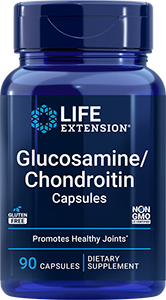
Does Glucosamine and Chondroitin Work? Supplement Uses
Published: July 2022
You stand up from your computer chair and realize your knees are stiff. When you get out of bed in the morning, your lower back seems to say to you, "Hey, not so fast!" And as you get older, it seems to happen more often. What gives? Age-related joint discomfort might be common, affecting millions of people across the U.S. every year, but that doesn't mean you have to take it lying down!
Thankfully, there's something you can do get ahead of the stiffness and discomfort that often comes with age. Glucosamine sulfate and chondroitin sulfate, along with healthy lifestyle habits, are among the best joint health supplements to improve comfort and range of motion.
In this article, we'll talk about glucosamine sulfate and chondroitin sulfate more, as well as how they behave when combined in a dietary supplement.
What is glucosamine?
Glucosamine is an important part of your cartilage, which serves as a cushion between your bones. In order to have healthy cartilage, you need to have an adequate amount of glucosamine. This is why people often supplement with it. Glucosamine's active form is called D-glucosamine.
Glucosamine supplements may be offered in different forms, including glucosamine hydrochloride (which isn't widely studied) and N-acetyl glucosamine. Glucosamine sulfate tends to be the supplement form of choice, and in this form, it pairs well with chondroitin. (Note: For the purposes of this article, we'll be focusing on the glucosamine sulfate form—but generally speaking, glucosamine hydrochloride and N-acetyl glucosamine will have similar effects on the body.)
What is chondroitin?
Chondroitin—specifically, chondroitin sulfate (which is a popular supplement form of chondroitin, just as glucosamine sulfate is a form of glucosamine)—is another essential building block for healthy cartilage, as well as other connective tissue. Chondroitin helps keep your cartilage in good shape by absorbing fluid into the tissue.
Chondroitin can also help inhibit the enzymes that break down cartilage, in addition to helping the body build new cartilage. This is especially important as we age. Studies even suggest that chondroitin can potentially support comfort in individuals experiencing normal age-related decreases in cartilage to help cushion their bones.
A Cushion for Your Joints: All About Cartilage
Before we get too far in the discussion of glucosamine, chondroitin, and how these two nutrients support your cartilage, let's take a step back. What is cartilage exactly, anyway?
Cartilage is your body's main form of connective tissue that you'll find in various types throughout your joints, bones, nose, ears, and even your lungs. The cartilage in between your bones covers the ends of the bones at the points at which they meet: the joint.
This makes it easier for joints to stay mobile and for you to move freely and safely. Cartilage is the reason why our bones can move the way they do with minimal friction.
So let's put it this way...any "friend" of cartilage is a friend of more comfortable joints, and that makes glucosamine as well as chondroitin very important friends indeed!
How does glucosamine/chondroitin work?
Glucosamine sulfate and chondroitin sulfate each support joint health. They are separate compounds that are commonly taken together in a dietary supplement form. Both glucosamine sulfate and chondroitin sulfate protect cells called chondrocytes, which are responsible for cartilage formation. So, when you supplement with glucosamine/chondroitin, you're supporting the cartilage that cushions your bones and joints. This, in turn, relieves joint discomfort.
What does glucosamine/chondroitin do for your body?
Glucosamine and chondroitin sulfate supplements offer all sorts of health benefits. They're often taken to support joint and cartilage health. They can maintain the cartilage structure and relieve joint discomfort. Chondroitin sulfate can also support a healthy inflammatory response.
A 2018 meta-analysis of three studies found that the combination of glucosamine and chondroitin offered significant benefits in inhibiting discomfort. A separate study identified that, when taken separately, glucosamine helped inhibit joint stiffness and chondroitin effectively relieved joint discomfort.
Who should take glucosamine/chondroitin supplements?
If you experience joint discomfort, glucosamine/chondroitin dietary supplements might be a good fit for you. Similarly, if you simply want to protect your joint health as you age, taking glucosamine or chondroitin separately or together can be a smart addition to a healthy lifestyle and diet.
Psst! Not sure if this supplement is right for you? Take our bone and joint health quiz.
Glucosamine with MSM vs. glucosamine/chondroitin
In addition to glucosamine/chondroitin supplements, you can get glucosamine combined with methylsulfonylmethane (MSM), which is another common compound for joint health. MSM is known for supporting joint mobility and function, as well as comfort of both the joints and muscles.
So, when choosing a joint supplement, how does glucosamine with MSM compare to glucosamine with chondroitin? Well, it's going to partly depend on what you're looking for. One popular reason why people take MSM is to make exercising more comfortable, while glucosamine/chondroitin is more for everyday joint support.
And there's no reason why you can't take all three of these nutrients together!
Explore Our Best Joint Health Supplements
Is glucosamine/chondroitin safe?
Yes, science tells us that glucosamine and chondroitin is safe to take long-term with no major side effects. The observed safe level (OSL) supports dosages up to 2000 mg a day for glucosamine sulfate and 1500 mg a day for chondroitin sulfate. These numbers reflect the highest dosages tested in human clinical trials.
Sure enough, science has compared test groups with placebo groups and found promising results. For example, one meta-analysis of eight placebo-controlled clinical trials with a combined 3,793 participants found that there was no marked difference in safety when comparing those taking glucosamine and chondroitin and those taking a placebo.
Research has also demonstrated that in large, well-conducted studies of people taking one supplement alone, or both combined, for up to three years, there were no serious side effects.
How much glucosamine/chondroitin should you take daily?
The best approach you can take (with glucosamine and chondroitin sulfate, or any other supplement) is to follow the instructions on the label, unless your healthcare provider indicates otherwise.
When is the best time to take glucosamine and chondroitin sulfate?
There's no specific time that is best. However, you should aim to take chondroitin:
- Around the same time every day
- With meals or a snack
How long should you take glucosamine/chondroitin?
You can take glucosamine and chondroitin for years, making it a good option for people looking to protect their cartilage. Interestingly, in one study, participants took glucosamine and chondroitin for six years and experienced preservation of cartilage health.
As we mentioned previously, glucosamine/chondroitin is safe for long-term usage without adverse effects. In a 2022 meta-analysis, studies lasting from six months to 24 months presented no safety issues or severe side effects. Chondroitin specifically has been used in dosages up to 2,000 mg daily for up to six years. Glucosamine supplements have been used in multiple controlled trials at dosages of 1,000-1,500 mg daily for anywhere from four weeks to three years.
How to choose high-quality glucosamine/chondroitin
Shopping for chondroitin, glucosamine or a combination of them shouldn't be any different than shopping for any vitamin or supplement. You want to look for brands that value transparency and source their ingredients responsibly and base the dosages on evidence-based research. Third-party certification is also important. Additionally, a supplement maker should be able to provide a Certificate of Analysis for every product it produces.
Who should not take glucosamine/chondroitin?
Glucosamine/chondroitin is generally safe and well-tolerated with no major side effects. However, you should check with your doctor if:
- You're 60 years of age or older and are being treated for eye conditions
- You are being monitored for your blood pressure
- You are sensitive to insulin
- You are pregnant or breastfeeding
What other supplements can I take for joints?
Glucosamine/chondroitin isn't the only way to promote joint comfort. Check out these other options:
- Collagen is the most abundant protein in our bodies and plays a big role in our bones, muscles, and tendons.
- A supplement that contains hyaluronic acid is another option because it supports lubrication of your joints (and skin, which is why you might already know of this ingredient from your anti-aging skincare routine), so movement is more comfortable.
- The fatty acids in krill oil make it a good supplement for people seeking to support a comfortable range of motion.
References
- Hathcock, John N. et al. "Risk assessment for glucosamine and chondroitin sulfate." Regulatory Toxicology and Pharmacology, February 2007, https://pubmed.ncbi.nlm.nih.gov/16942821/
- Meng, Zhengyuan et al. "Efficacy and safety of the combination of glucosamine and chondroitin for knee osteoarthritis: a systematic review and meta-analysis." Arch Orthop Trauma Surg., January 2022, https://pubmed.ncbi.nlm.nih.gov/35024906/
- Nahian, Ahmed et al. "Histology, Chondrocytes." StatPearls, April 2022, https://www.ncbi.nlm.nih.gov/books/NBK557576/
- Ogata, Toru et al. "Effects of glucosamine in patients with osteoarthritis of the knee: a systematic review and meta-analysis." Clinical Rheumatology, April 2018, https://link.springer.com/article/10.1007/s10067-018-4106-2
- Raynauld, Jean-Pierre et al. "Long-Term Effects of Glucosamine and Chondroitin Sulfate on the Progression of Structural Changes in Knee Osteoarthritis: Six-Year Followup Data From the Osteoarthritis Initiative."Arthritis Care Res (Hoboken)., October 2016, https://pubmed.ncbi.nlm.nih.gov/26881338/
- Williams C, Ampat G. "Glucosamine Sulfate." StatPearls, January 2022. https://www.ncbi.nlm.nih.gov/books/NBK558930/
- Zhu, Xiaoyue et al. "Effectiveness and safety of glucosamine and chondroitin for the treatment of osteoarthritis: a meta-analysis of randomized controlled trials." J Orthop Surg Res., July 2018, https://www.ncbi.nlm.nih.gov/pmc/articles/PMC6035477/
- "Chondroitin." Mount Sinai, https://www.mountsinai.org/health-library/supplement/chondroitin
- "Glucosamine and Chondroitin for Osteoarthritis." National Center for Complementary and Integrative Health, https://www.nccih.nih.gov/health/glucosamine-and-chondroitin-for-osteoarthritis
- "Glucosamine and Chondroitin for Osteoarthritis Pain." Arthritis Foundation, https://www.arthritis.org/health-wellness/treatment/complementary-therapies/supplements-and-vitamins/glucosamine-chondroitin-osteoarthritis-pain
- "Joint Pain and Arthritis." Centers for Disease Control and Prevention, https://www.cdc.gov/arthritis/pain/index.htm
Like what you read?
Please subscribe to get email updates on this blog.







